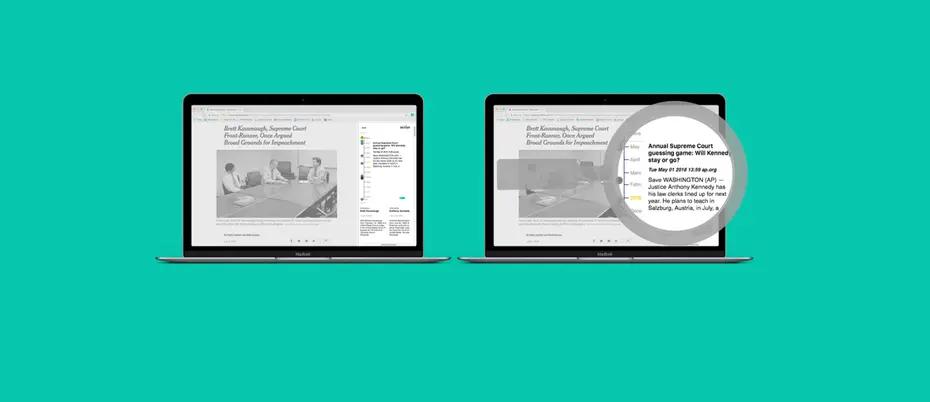This MIT startup provides a way to ‘binge watch’ news articles
The explosion of digital content has made it hard to navigate news today. This startup’s plug-in will cut down on time and browser tabs, while readers search for information.
Acciyo’s name might draw from fiction, but the purpose of the search engine extension is firmly rooted in fact.
“When I was first figuring out what we wanted to call it, I went through a list of Harry Potter spells,” said co-founder Anum Hussain, MBA ’18. “Acciyo was very fitting because what we’re doing is summoning information from across the web and making it easier for you, in a similar fashion to how that spell [in the book series, ‘accio’] works, to be able to summon anything you need. We’re just doing that in the context of news.”
Acciyo, Hussain said, is a Google Chrome extension that appears to the right of a screen like a bookmark, and presents the user with an “interactive, movable timeline of articles previously published on the subject you’re currently reading.”
Acciyo founders: Anum Hussain and Vivian Diep
The plug-in pulls from wire content — the Associated Press and Reuters — and automatically pops open on major U.S. news sites. Hussain said as the company evolves they will explore other news sources to pull from.Because the stories are from the wire, Hussain explained, they tend to be bigger stories that would likely be found on a publication’s front page. For example: the nomination of Brett Kavanaugh to the Supreme Court of the United States. The plug-in would include stories on Kavanaugh’s background, his nomination, as well as earlier stories about other candidates considered for the role.
“If your friends are talking about a new show that you haven’t been able to keep up with, you can dedicate a few hours on the weekend and binge watch that show,” Hussain said. “There’s no way to binge read a topic in the news. If you’ve been outside that news story and everyone is starting to talk about it, we hope that Acciyo can help you binge read that story and get up to date in a similar fashion.”
In context
The idea for the plug-in has its roots in Hussain’s previous work experience at The Boston Globe and HubSpot. She said as an MBA candidate at MIT, she started to reflect on content marketing and news media, and how the evolution of digital publishing and the number of publishers today has made it difficult to navigate news.
“News seekers are people who see the news as part of their identity, or passion of theirs,” Hussain explained. “When they come across something they don’t know, they want the nuances, they want to be able to dig deep. But their process is very manual, it’s opening tabs, searching through endless pages of Google Search, Wikipedia. We wanted to replace that process and be the tool that actually organizes the news and puts the news in context for you.”
Hussain and Acciyo co-founder Vivian Diep, SM ’15, aren’t the only ones looking to make it easier to read the news, but Hussain said her company is the only one targeting readers who hold more senior job roles — not just college students looking for a quick summary of news events.
In early July 2018, Acciyo opened the product to their waiting list of 200 during a private beta launch. Hussain said there are about 50 initial users, and the company is working toward a public launch by the end of the summer — after some bugs and General Data Protection Regulation compliance is ironed out.
Asked about revenue, Hussain said the company is currently focused on user growth and retention.
She said the team is also processing early user feedback, including the creation of a “mark as irrelevant” button that readers can click when they notice something in a timeline that doesn’t make sense, “allowing users to be a part of the solution.”




